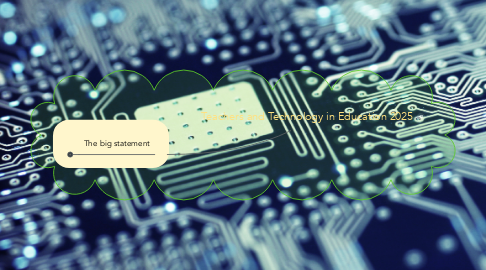
1. The big statement
1.1. "We’re at the point where the Internet pretty much supplies everything we need. We don’t really need teachers in the same way anymore."(Godsey; Michael;, 2015)
1.1.1. It is interesting to hear from the educators themselves about this situation with the future of education in 2025 when technology becomes a bigger factor in our life. This is a big statement and although some can argue for its legitimacy, the three topics below prove somewhat the degree of accuracy in this statement.
1.1.2. 1. The role of a facilitator and coach.
1.1.2.1. When self-driving cars are taking over jobs of truck and taxi drivers, teachers are not an exception with technological advances that allow machine to deliver lectures and provide assessment. In the “Education Data in 2025” publication, Chester E. Finn Jr. expressed a belief that cyberspace and secure databases has been the most profound advance of technology since 2010. Used with a unique identifier such as the student’s UI number, technology made it possible to store, share, and retrieve anonymously. Further processes such as performance analysis and assessment are then performed electronically and automatically from the use of data from these databases. (Finn Jr., 2010) What I’ve just described to you from the publication, does it sounds familiar? The entire process used to be done exclusively by humans, and we call them teachers! Even the other stream of communication in education, from the parents to the teachers and vice versa, is now partially powered by technology. Parents can easily access their kids’ grade cards, test results, performance, and feedbacks given by the machine through the use of internet directly from home. Fast forward in the next 10 years or so, would this process still be a “partial” thing? This implies a shift from teachers being educators to facilitators and coaches. (Kamenetz, 2015)
1.1.3. 2. What about Google?
1.1.3.1. The question of “If you can Google it, why teach it?” comes up in the interview of NPR and Joshua Starr, the head of Washington, D. C’s student district, was stated to be a popular thought starter for teachers to emphasize the importance of critical thinking and creative problem solving, the two pillars of human intelligence that are vital to the role of teachers. This isn’t chosen as a thought starter for no reason, it is important to understand the power and preparation Google has in store when it comes to artificial intelligence in the future of education. Here are a few of their aims that might get you questions the need for physical appearance of teachers in a classroom (Kurshan, 2016) . Image (UxCircus, 2017)
1.1.3.1.1. 1. Virtual mentors for every learners.
1.1.3.1.2. 2. Provide opportunities for global classrooms.
1.1.3.1.3. 3. Taking learning outside of the classroom and into the learner’s life outside of school.
1.1.4. 3. The free access of knowledge.
1.1.4.1. The internet, following the technological advances in education, has been actively a place for free resources for lesson planning and obtaining almost every educational material a student might need! From workbooks, readings, classnotes, assignment solutions, to even the curriculum for many school programs, all are provided free of cost. (Godsey; Michael;, 2015) A starring example for this area in the future of technology is the Kahn Academy with more than 100,000 interactive lessons and 6,500 free videos on various subjects! The amount and accessibility of free knowledge doesn’t simply affect students as Forbes has reported that over 500,000 teachers worldwide has been using the resources themselves, not including more than 500 million views on YouTube. (Kahn Academy, 2017) Ted Talk is a stunning example for this topic of internet-powered education. (Video: (TED, 2016) )
1.1.5. References
1.1.5.1. Finn Jr., C. E. (2010). Education Data in 2025. Retrieved from Education Next: Education Data in 2025 - Education Next Godsey; Michael;. (2015). The Deconstruction of the K-12 Teacher . Retrieved from The Atlantic: https://www.theatlantic.com/education/archive/2015/03/the-deconstruction-of-the-k-12-teacher/388631/ Kahn Academy. (2017). Home Page. Retrieved from Kahn Academy: https://www.khanacademy.org/ Kamenetz, A. (2015). Q&A: Exit Interview With A Nationally Known School Leader . Retrieved from NPR: http://www.npr.org/sections/ed/2015/02/15/385774711/q-a-exit-interview-with-a-nationally-known-school-leader Kurshan, B. (2016). The Future of Artificial Intelligence in Education . Retrieved from Forbes: https://www.forbes.com/sites/barbarakurshan/2016/03/10/the-future-of-artificial-intelligence-in-education/#299b3d362e4d TED. (2016). The top 10 TED Talks of 2016 . Retrieved from YouTube: https://www.youtube.com/watch?v=Dph6ynRVyUc The Conversation. (2013). In 2025, will we still be sending our kids to school? . Retrieved from The Conversation: http://theconversation.com/in-2025-will-we-still-be-sending-our-kids-to-school-11378 UxCircus. (2017). AI, Machine Learning & Cognitive Systems . Retrieved from Pinterest: https://www.pinterest.com/uxcircus/ai-machine-learning-cognitive-systems/
